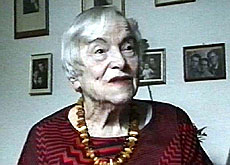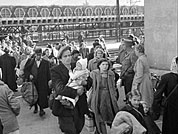Refugee remembers Hungarian uprising

Historian Andreas Oplatka relives for swissinfo his experience of the Hungarian uprising 50 years ago and being a young refugee in Switzerland.
The anti-Communist revolt started on October 23, 1956, but was brutally crushed by Soviet troops. In the aftermath, around 200,000 people fled to Switzerland and other western countries.
The uprising only lasted a few days but its failure put paid to all hopes of freedom in Hungary and cemented the nation’s place in the Eastern European Communist bloc.
Hundreds of thousands of people left the country, with around 14,000 seeking refuge in Switzerland. Among them was the Oplatka family. The historian, journalist and university teacher remembers those turbulent times well.
swissinfo: Why did your family leave Hungary?
Andreas Oplatka: In 1956 my family lived in Budapest, the heart of the uprising. As in many families in Hungary, our family was of a liberal bent and opposed the [Communist] regime. Both my brother and I were brought up in this climate. So during the uprising, at age 14, I took part in some demonstrations and my brother, a student, joined the revolt.
At the beginning of November, following the arrival of the Russian troops, imprisonment and deportations of young people who had taken part in the uprising began. My father decided to leave the country because he feared my brother would also end up in prison. He was convinced that Hungary would be plunged into a political darkness in which there would no longer be room for the liberally minded. My father didn’t want his sons to grow up in this atmosphere.
swissinfo: Was it these feelings of fear and resignation that led so many people to leave the country within the space of a few days?
A.O.: I think that among the expatriates there was a general feeling of disappointment and despair. Almost all of them had basically lost all hope of being able to live with dignity in Hungary. In any case, for those who had taken part in the uprising the only way of getting to safety was to leave the country.
In the months that followed, the Communist regime put more than 20,000 people in prison and executed between 300 and 500 people. It was a period of cruel repression and as a result around 100,000 Hungarians suffered for many years. There were constant police checks, people were banned from carrying out their professions and subjected to censorship and intimidation. You still meet people in Hungary today who are extremely embittered by what they lived through.
swissinfo: Why did your family decide to come to Switzerland?
A.O.: We came to Switzerland because many years before my father had studied at the Federal Institute of Technology in Zurich. Switzerland was like his childhood sweetheart. In his mind it had been clear to him for some time that if he had to leave Hungary it would be to go to Switzerland.
swissinfo: How much did the reality of life in Switzerland correspond to the idea of the western world people had on the other side of the Iron Curtain?
A.O.: The first experience of life in Switzerland or in other western countries was jaw dropping for many people. The standard of living, the modern cities, the state of the roads and the quality of accommodation were so different to what they had experienced in Communist countries, which were still poor after the war and badly managed economically.
Many Hungarians were attracted to the West by the promise of economic wealth. Many of them didn’t realise that this wealth would come at a price. To attain it you needed to perform well and have a work ethic – two things which had already almost been forgotten under Communism. The first few years were difficult for many refugees – not all were successful as quickly as they had hoped.
swissinfo: Despite a few difficulties, the integration of refugees from Eastern Europe in Switzerland went very well on both sides.
A.O.: The Hungarian refugees of 1956, like others fleeing Czechoslovakia in 1968, were welcomed generously by the Swiss population and therefore benefited from excellent integration. This integration was made easier too because very often they were well educated. Furthermore, despite some differences in mentality, they shared most of the same human and cultural values as people in Western Europe.
swissinfo: Do you think that the attitude would have been the same had the Hungarian and Czechoslovak refugees not come from Communist countries?
A.O.: The political factor certainly played an important role, whether in 1956 or 1968. But to answer this question you really have to consider the refugees from other countries, for example from Chile in the 1970s, to find out if they received a colder welcome. It was probably the case. Nonetheless among Eastern European refugees there is still a widespread and strong feeling of gratitude towards Switzerland, its people and its authorities.
swissinfo: It has often been said that Eastern European refugees become more Swiss than the Swiss. Do you also have this impression?
A.O.: That’s something which one could probably explain using a comparison: a Spanish or Italian worker who immigrated to Switzerland in the 1950s still had a passport and generally intended to return home. The Eastern European refugees came to Switzerland knowing that for them there was no hope of returning.
swissinfo-interview: Armando Mombelli
On October 23, 1956 a student demonstration in Budapest was transformed in just a few hours into a huge protest involving more than 100,000 people against the Communist regime.
On October 24, 2006 the population descended onto the streets in other Hungarian cities to call for freedom of the press and speech, free elections and independence from the Soviet Union.
On November 4, 2006 Soviet troops crushed the revolt. 2,600 people died during the clashes that lasted around 10 days. Thousands were imprisoned and hundreds were executed.
Around 100,000 people fled during between November and December towards Western Europe. Switzerland accepted around 14,000 refugees.
On October 23, 2006 Hungary will commemorate the 50th anniversary of the revolution, along with dozens of heads of state and government including Swiss President Moritz Leuenberger.
Andreas Oplatka was born in 1942 in Budapest. His father was an engineer and his mother a pharmacist.
In 1956, after the intervention of the Soviet army, the family fled to Switzerland.
In 1968 Oplatka received a doctorate from Zurich University.
From 1968-2004 he worked for the Zurich-based Neue Zürcher Zeitung, and was correspondent in several European capitals, including Budapest.
Since 2000 he has taught history and communications at the universities of Vienna and Budapest.

In compliance with the JTI standards
More: SWI swissinfo.ch certified by the Journalism Trust Initiative



You can find an overview of ongoing debates with our journalists here. Please join us!
If you want to start a conversation about a topic raised in this article or want to report factual errors, email us at english@swissinfo.ch.